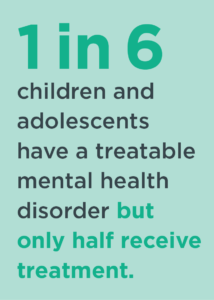Concerned About Your Child’s Behavior? Here’s a Free Mental Health Assessment

Children and teens display a range of behaviors and emotions as they go through important developmental stages. At times, this can include challenging behaviors and it can be difficult for a parent to know whether it’s healthy or something to be concerned about. When a child’s behaviors become persistently challenging, disruptive or harmful to themselves or others, they may need professional services to help them learn how to manage their emotions. If you’re concerned about your child’s behaviors, completing a mental health assessment can help you determine if it’s time to seek professional support.
KVC Health Systems has created a free mental health assessment you can do at home with your child to determine if their behavior may be tied to a deeper mental health need. This resource also provides guidance on what you can do to seek guidance and professional services. Click here to download it now.
has created a free mental health assessment you can do at home with your child to determine if their behavior may be tied to a deeper mental health need. This resource also provides guidance on what you can do to seek guidance and professional services. Click here to download it now.
Please note: The information contained in this quick assessment should not be used as a substitute for the medical care and advice of a mental health professional.
Typical Challenging Behaviors Based on a Child’s Age
Toddlers:
- Tantrums
- Saying “No!”
- Beginning to show independence
- Biting or hitting
Preschoolers:
- Testing the limits of rules
- Asking “Why?”
- Telling lies or arguing
School-age:
- Challenging rules or failing to comply with them
- Acting bossy or wanting to be in control
- Showing strong independence

Teenagers:
- Defiance against rules or authority
- Argumentative
- Drastic changes in appearance
- Spending a lot of time on their phone or hanging out with friends
- Asserting independence
Challenging Behaviors That Are Not Healthy
- Self-harm or causing physical harm to others
- Suicidal statements
- Aggressive actions like choking, biting, hitting and throwing
- Explosive disruptions in the classroom or making threats
- Consistently not responding to directions of higher authority and showing general noncompliance
- Stealing
- Bullying and fighting others
- Inappropriate touching of others
- Abusing drugs or alcohol
- Dramatic changes in typical school performance
- Excessive isolation/not wanting to be around loved ones
- Running away or not coming home for extended periods of time
- Exhibiting dangerous behaviors on the internet
Strategies That Can Help You Prevent Challenging Behaviors
- Practice: Create teachable moments after a negative behavior is displayed. In a calm manner, show your child what you want them to do instead and help them practice. These teachable moments can also occur after a positive behavior by telling your child validating phrases and praise such as, “I like the way you did that.”
-

Praise: Aim for the 90:10 rule. Praise should be given out 90% of the time and limit-setting or discipline should only be used 10% of the time. When you catch your child doing something good, reinforce that behavior with positive praise.
- Persist: Remain consistent in your rules and routines. Children flourish when they know what to expect and what goals to meet. When you are consistent and predictable, you and your child are on the same page with what you expect from each other.
All behaviors are a form of communication for children. Challenging behavior is not because of a “bad child” or “bad parenting.” Challenging behavior can be the result of many elements, including an underlying mental health need and/or the effects of negative life experiences. Complete this free 10-question mental health assessment with your child to determine if they may benefit from professional support.
Speak with your physician, local community health center, school counselor, or a mental health professional to address concerns and receive guidance. It takes a village to raise a child and it’s always okay to ask for help and support.
If you’re in one of the following states, contact KVC to see how our services can help your child or family:
-
- Kansas and Missouri: contact KVC Hospitals at (913) 890-7468 or visit kvchospitals.org
- Kentucky: contact (859) 254-1035 or kvcky.org
- Nebraska: contact (402) 498-4700 or visit kvcnebraska.org
- West Virginia: contact (304) 347-9818 or visit kvcwv.org





